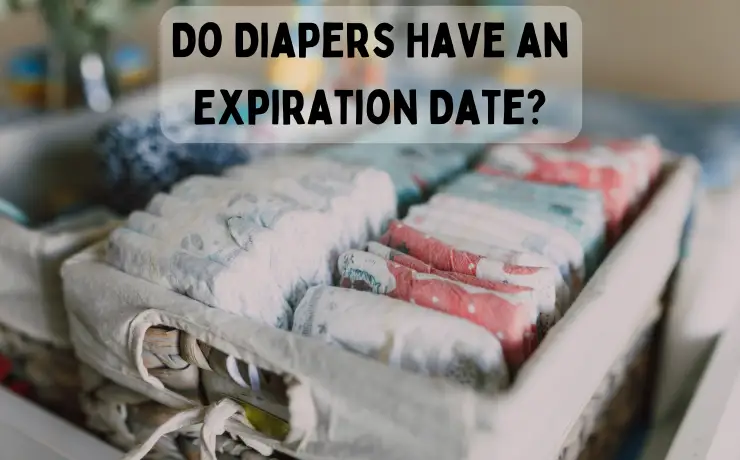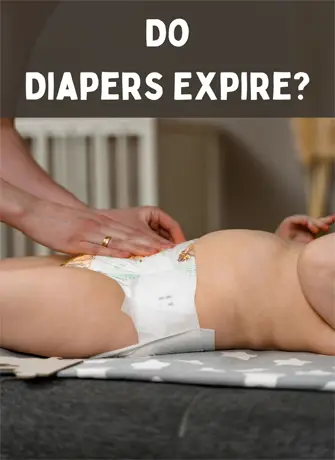Do Diapers Have an Expiration Date? is a question that parents frequently ask, but it is often not thoroughly discussed. As anyone raising a baby knows, there are countless queries that come with parenting, and some are less straightforward than others.
Today, we’ll delve into this particular topic with an expert’s eye, illuminating all the critical aspects associated with the lifespan and safe usage of diapers.
Do Diapers Expire?
No, diapers do not expire. Contrary to the common notion around perishable products, diapers do not carry an official expiration date. Manufactured using materials like synthetic polymer and superabsorbent particles, they don’t biodegrade or lose their basic function over time in the way organic materials do. Therefore, from a pure usage standpoint, diapers do not expire.
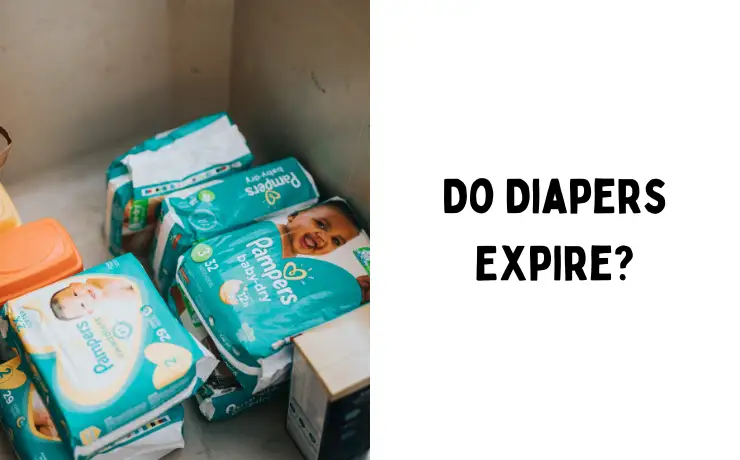
Do Diapers Go Bad?
While it’s true that diapers lack a designated expiration date, it’s crucial to remember that their efficacy isn’t immune to degradation over time.
Unlike food items, diapers won’t “go bad” or “spoil,” but that doesn’t mean they retain their optimal functionality indefinitely. Multiple factors can impact a diaper’s quality negatively, even while they’re securely packaged.
Diapers are primarily composed of synthetic materials and superabsorbent polymers designed to wick moisture away from the baby’s skin. Over time, however, these materials can be impacted by the environmental conditions in which they are stored.
This change doesn’t result in diapers becoming “spoiled” in the traditional sense—meaning they won’t develop mold, bacteria, or rot—but it can lead to a decrease in the diaper’s overall performance.
The main concerns related to diaper degradation revolve around three core diaper components: the absorbent core, the elastic, and the adhesive fastening system. Over time and under certain conditions, the absorbent core’s efficiency may decrease, the elastic may lose its stretch, and the adhesive fasteners may not stick as well. This degradation can lead to common diaper issues like leakage, poor fit, and general discomfort for your baby.
So, while it’s safe to say that diapers don’t “go bad” like perishable food, their quality can certainly be compromised over time. It’s always important to store diapers properly and be aware of any changes in their performance or physical attributes. This way, you ensure the best care and comfort for your little one.
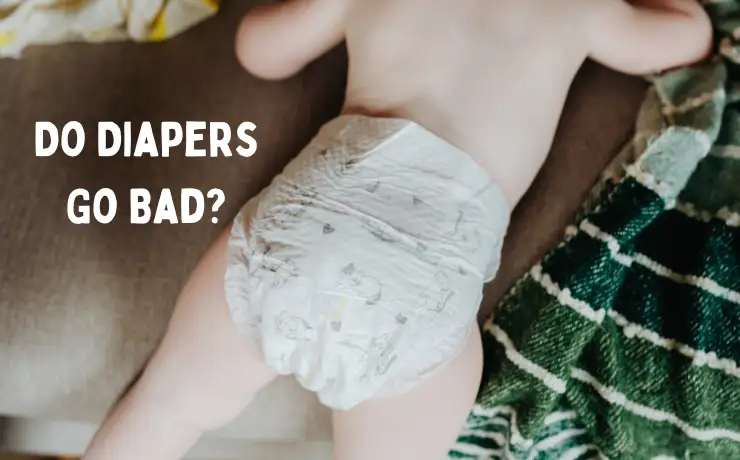
Factors Affecting Diapers Badly
Several environmental and storage conditions can affect the quality of diapers:
- Humidity: Diapers stored in highly humid conditions may lose their absorption capability, leading to potential leakage.
- Temperature Extremes: High temperatures can impair the adhesiveness of the diaper’s tapes, while cold temperatures may make the diaper stiff and less flexible.
- Pests: Rodents or insects can cause physical damage to the diapers if they manage to get into the packaging.
How Long Do Diapers Last?
Understanding the longevity of diapers can be a bit of a puzzling task given that they don’t come with a clear expiration date. While the actual lifespan of diapers can be influenced by various storage conditions, there are some general guidelines you can follow to ensure optimal use.
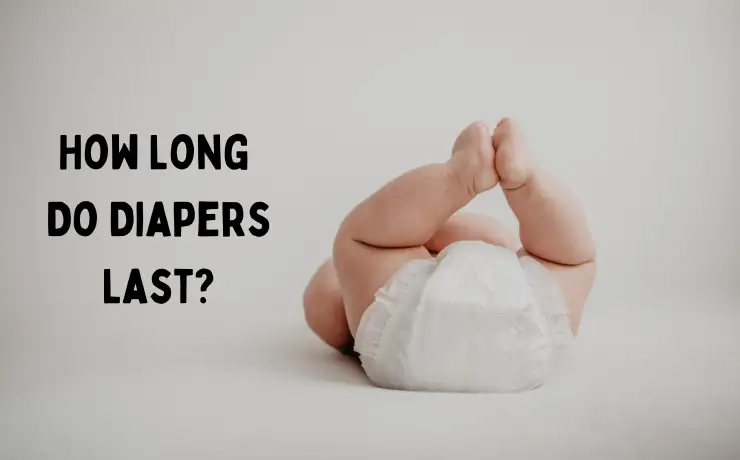
How Long Do Opened Diapers Last?
Once you break the seal of a diaper pack, it becomes more susceptible to the effects of the surrounding environment. Elements such as humidity, heat, and cold can start to impact the diapers.
These factors can lead to a gradual decline in the performance of the diaper, potentially affecting its absorbency, elasticity, and adhesive properties.
For this reason, once a pack of diapers has been opened, it’s generally recommended to use them within a year. Although they may still be safe and usable after this period, their effectiveness could be diminished, leading to potential leakages or less-than-ideal fit for your baby.
How Long Do Unopened Diapers Last?
When left unopened, diapers can maintain their quality for an extended period, often for several years, particularly if stored under optimal conditions. This is because the packaging acts as a barrier, protecting the diapers from environmental factors that could lead to degradation.
However, even under the best of conditions, it’s advisable to use unopened diapers within two years of purchase. This is to ensure your baby experiences the maximum level of comfort and efficiency that the diapers are designed to provide. Beyond this period, while the diapers would remain safe to use, their performance could begin to wane.
In conclusion, the lifespan of diapers is significantly influenced by their storage conditions and whether they’re kept sealed or opened. Observing these general guidelines can help you get the most out of your diapers while ensuring your baby’s comfort and health.
Diapers Spoilage Signs
Though diapers don’t spoil in the traditional sense, there are clear indicators that can point to a reduction in their overall quality and effectiveness. Understanding these signs can help you ensure that your baby remains comfortable, dry, and safe. The important signs to watch for are:
- Loss of Elasticity in the Sides: Elasticity in the sides of a diaper is essential for a secure, comfortable fit around your baby’s legs. Over time, or due to improper storage conditions, the elasticity can degrade, resulting in a loose fit. This can lead to leakage and potential discomfort for your baby. If the diaper sides no longer spring back into shape after being stretched, it’s a sign the quality has been compromised.
- Discoloration or Change in the Texture of the Diaper: Changes in the color or texture of the diapers can be signs of quality degradation. Ideally, diapers should be soft, white (or the color they were when purchased), and free of any discoloration or unusual spots. If you notice any yellowing, hardening, or other texture changes, this could indicate that the diaper has been affected by environmental conditions and might not perform as effectively.
- Weakened Stickiness of the Tapes: The adhesive tapes on the sides of diapers are crucial for ensuring a proper fit. Over time, or due to exposure to heat and humidity, these adhesives can lose their stickiness. If the tapes don’t adhere properly, the diaper may not fit securely, increasing the risk of leaks and discomfort for your baby.
- Unpleasant Odor: Diapers should be essentially odorless, aside from any fragrance added by the manufacturer. If you notice a strange, unpleasant smell when opening a new diaper, it could be a sign of poor storage conditions or prolonged storage, which might have affected the diaper’s quality.
Recognizing these signs is important for maintaining your baby’s comfort and hygiene. If you come across any of these symptoms, it’s best to dispose of the affected diapers to ensure your little one only uses the ones that provide optimal protection and comfort.
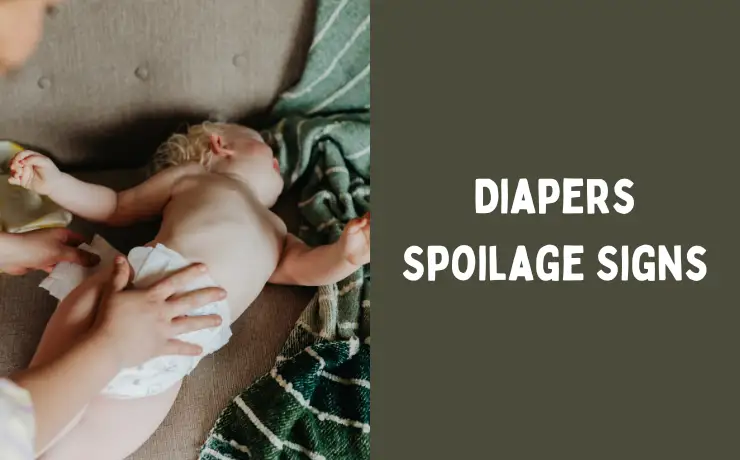
Diapers Shelf Life
Diapers are designed to provide optimal performance for a significant period post-manufacture. Under ideal circumstances, they maintain their peak performance for about two years. It’s during this period that you can expect the highest absorbency, greatest elasticity, and strongest adhesive properties.
Beyond the two-year mark, diapers won’t suddenly become unusable, but their effectiveness may start to degrade, especially if they’ve been stored in less-than-optimal conditions.
Exposure to high temperatures, direct sunlight, and humidity can all accelerate the breakdown of the materials, leading to decreased absorbency, loss of elasticity, and weakened adhesive.
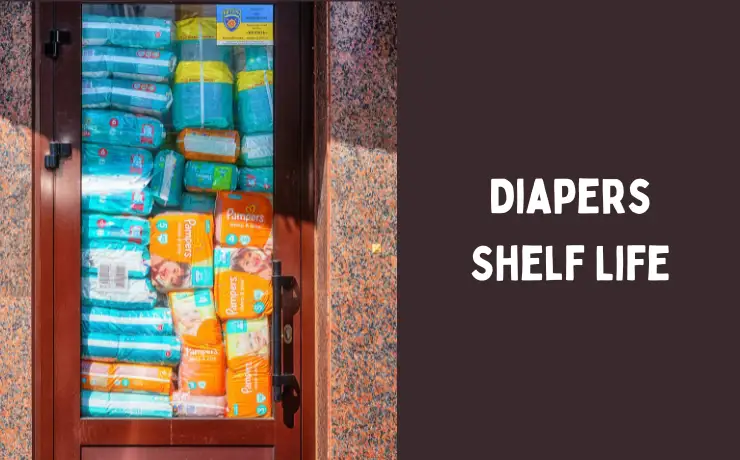
How to Properly Store Diapers
Proper storage of diapers is a crucial aspect of maintaining their quality, effectiveness, and longevity. Storing diapers correctly can help ensure that they provide the best comfort and protection for your baby.
Here are a few important diaper storage tips to bear in mind:
Diaper Storage Tips
- Store Diapers in Their Original Packaging: Diaper packages are designed to protect diapers from environmental factors, keeping them in their best condition. Always keep your diapers in their original packaging until you’re ready to use them.
- Choose a Cool, Dry Area for Storage: Temperature and humidity play significant roles in the preservation of diapers. It’s best to store them in a cool, dry place, away from direct sunlight, extreme temperatures, and high humidity. This helps to preserve their absorbency, elasticity, and adhesive properties for longer.
- Rotate Your Stock: Always use the oldest packs of diapers first. This approach, often referred to as the “first-in, first-out” method, helps ensure that you’re always using the freshest diapers. It can prevent you from discovering a pack of diapers that’s been hidden away and forgotten about, only to find that their quality has deteriorated.
By understanding the shelf life of diapers and adhering to these storage tips, you can ensure that your diapers are always in the best possible condition when it’s time to use them.
This not only maximizes their effectiveness but also helps ensure your baby’s comfort and well-being.
SEE OFFER Baby Diaper Caddy
Side Effects of Using Bad Diapers
While diapers don’t traditionally “go bad” or “expire,” their quality can degrade over time due to various factors. Using diapers that have deteriorated in quality can lead to several potential issues that can cause discomfort for your baby and create additional challenges for you.
Here are some of the side effects that can result from using degraded diapers:
- Leaks: One of the first signs of a degraded diaper is a reduction in its absorbency, leading to leaks. The superabsorbent polymers in the diaper that are designed to soak up and contain your baby’s waste might lose their effectiveness over time. This can result in leaks that are not just uncomfortable for your baby but can also create a significant mess for you to clean up.
- Skin Irritation: Diapers are in direct contact with your baby’s sensitive skin for a significant portion of the day. Any changes in the materials of the diaper – such as hardening of the lining or chemical changes caused by excessive heat or moisture – could potentially cause skin irritation. In some cases, this can lead to diaper rashes, which can cause discomfort and require treatment.
- Poor Fitting: The elasticity of the sides and the stickiness of the diaper tapes are vital for ensuring a snug and comfortable fit. Over time, these elements can degrade, particularly if the diapers are exposed to unfavorable conditions. This can lead to a poor fit, which not only increases the risk of leaks but can also cause discomfort for your baby. The diaper may sag, move around, or even come off entirely, potentially leading to accidents.
Diapers Go Bad FAQ
In this section, we’ll answer some common questions about diapers expiration and storage:
Do diapers have an expiration date?
No, diapers do not have a specific expiration date. However, they do have an optimal shelf life, typically around two years, beyond which their effectiveness can start to decrease.
What causes diapers to go bad?
Diapers can degrade in quality due to environmental factors such as heat, humidity, and direct sunlight. If stored improperly, the absorbency, elasticity, and adhesive properties of the diapers can deteriorate over time.
Can I use diapers that are more than two years old?
Yes, you can use diapers that are more than two years old, but their effectiveness might be slightly decreased, and there may be a risk of leaks or poor fit.
How can I tell if a diaper has gone bad?
While diapers don’t spoil in the traditional sense, signs of deterioration can include loss of elasticity in the sides, discoloration or changes in texture, weakened stickiness of the tapes, and an unusual odor.
What are the potential effects of using degraded diapers?
Using degraded diapers can lead to leaks due to decreased absorbency, skin irritation from material changes, and a poor fit due to loss of elasticity or adhesive strength.
What’s the best way to store diapers to maintain their quality?
Diapers should ideally be stored in a cool, dry place, away from direct sunlight and extreme temperatures. It’s also best to keep them in their original packaging until they are ready to use and to use older packs first.
Are unopened diapers better preserved than opened ones?
Yes, unopened diapers tend to maintain their quality for longer as the packaging protects them from environmental factors. Once opened, it’s recommended to use the diapers within a year for maximum efficiency.
Can bad diapers harm my baby?
While they won’t cause serious harm, degraded diapers can lead to discomfort due to leaks, potential skin irritation, and poor fit. Always inspect the diaper for signs of degradation before use.
For beauty and skincare products, you can check out these articles: Does castor oil have an expiration date, does Retinol Serum Expire, do foot peel masks expire and, does vitamin C serum go bad?

